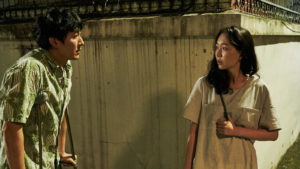 Review: Wisconsin Film Festival
Review: Wisconsin Film Festival
Yourself and Yours | Hong Sang-soo | South Korea | 2016 | 86 minutes
UW Cinematheque, Friday, March 31, 5:30pm»
Sundance Cinemas, Saturday, April 1, 6:45pm»
Hong Sang-soo’s charming absurdist allegory Yourself and Yours takes a modern look at the renewable spirit of romantic love, the fluidity of self and identity, and the idea that maybe we should all just get a drink and get along. Emily Caulfield reviews the film for our 10-day Wisconsin Film Festival preview.
South Korean director Hong Sang-soo enjoys a fluid relationship with reality and surreality, supported by a romantic spirit. Fresh from 2015’s acclaimed Right Now, Wrong Then, Hong has been praised with comparisons to Luis Buñuel. Variety’s Scott Tobias describes Hong’s latest film an “inspired reversal of [Buñuel’s] That Obscure Object of Desire,” because one actress plays multiple versions of her character.
In Yourself and Yours, the women in the life of a gentle painter, Youngsoo (Kim Joo-hyuck), cause him distress. These women include his heard-but-not-seen mother, whose grave illness makes him contemplative, and at least two versions of his girlfriend Minjung (Lee You-young). Both (or more?) Minjungs are out and about in Seoul, living it up drinking iced coffee and soju and beers with various other men.
Youngsoo commiserates with his friend Kim (Kim Eui-sung): Should he marry Minjung? Kim replies with a hard no, and hints that Minsung might not be the marrying type. He gossips with Youngsoo that Minjung was seen drinking at the neighborhood bar and quarrelling with a man, even though she promised Youngsoo to limit her drinking. She agreed to cap it at five bottles of soju and two beers, which sounds like a pretty breezy compromise if you ask me.
The gossip upsets Youngsoo, and he realizes that his friends do not jive with his lady love. Youngsoo confronts Minjung, and she denies it all, calling his friends a bunch of bastards. She thinks it might be best if they don’t see each other for a little while. Minjung leaves, and Youngsoo’s heart cracks open.
As soon as she walks out of his life, Youngsoo questions his decision. Then all sorts of questions begin to pop up about the woman he thinks he loves. As Youngsoo fruitlessly searches for Minjung at home and work, we see some of what she might be up to.
Jaeyoung (Kwon Hae-hyo), a chill-seeming older dude, approaches her and asks if she’s Minjung. They partied together a while back, right? She laughs at him, claiming not to know anyone by that name. He’s unconvinced, but lets it go. She flirts with him, and he perks up again, easily agreeing to whatever she suggests (getting drunk). Later, she meets another eager suitor called Lee (Yoo Jun-sang), a filmmaker who thinks he recognizes her, but she says they’ve never met.
Who is this beguiling woman? Is she trickster, an amnesiac, a set of triplets? By the time Youngsoo finds her again, we truly have no idea whether Minjung is one, or all of these women, or simply the fevered apparitions of a lovesick ex.
Hong also wrote the Yourself and Yours, whose enigmatic and sensual concept is embodied by Lee You-young’s performance as Minjung. She’s so cute and sweet, with a fierceness that comes out of absolutely nowhere. During her confrontation with Youngsoo, and repeatedly throughout the film, she flows like water—just as forceful, just as volatile. Hong presents this mercurial quality in a series of situations: picking up and turning men down, moods lightened or darkened with a compliment or a challenge.
Minjung moves, morphs in unexpected ways. In a small non-moment, she splashes methodically all the way down a stream, and then, after meeting filmmaker Lee, turns around and walks with him back the way she came. In this fickle, slippery way, she seems to be Youngsoo’s romantic insecurities manifest.
And yet, there is hope in Minjung’s seemingly endless varieties. She places more faith in forgiving and forgetting than in an endless search for righteousness or truth. Minjung’s words are often more oracular than expository. She’s sphinxlike in her ambiguity, repeating lines like “it’s better not to know” and “why ask questions” that convey more wisdom than teasing (but a healthy dose of each). However, paired with the film’s cheerful score—really just an effervescent chorus, recurring as a comment or a counterpoint to the action—her sagacity really does deliver more light than dark.
We’ll remember this light in its resolution, as Youngsoo and Minjung reach theirs, as in all relationships when the particulars fade and we can remember only the good times, candles at dinner, hugging in the garden, fresh fruit in bed.